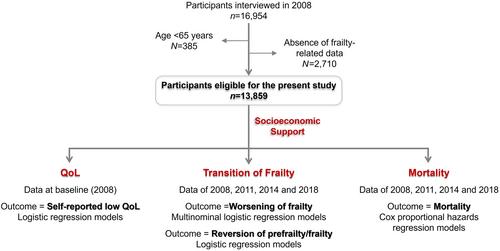Although socioeconomic support is recommended for frailty management, its association with the prognosis of frailty is unclear.
Using data from participants aged ≥65 years in the Chinese Longitudinal Healthy Longevity Survey (2008–2018), the associations between socioeconomic support (source of income, medical insurance, community support, living status), onset of prefrailty/frailty, and worsening of prefrailty, were analyzed using multinominal logistic regression models. The associations between self-reported low quality of life (QoL) and reversion of prefrailty/frailty were analyzed using multivariate logistic regression models. Associations with mortality risk were analyzed using Cox proportional hazard regression models.
A total of 13,859 participants (mean age: 85.8 ± 11.1 years) containing 2056 centenarians were included. Financial dependence was a risk factor for low QoL among prefrail/frail individuals, but not among robust individuals. Having commercial or other insurance, and receiving social support from the community were protective factors for low QoL among prefrail/frail individuals and for the worsening of prefrailty. Continuing to work was a risk factor for low QoL, but a protective factor for worsening of prefrailty. A negative association between continuing to work and mortality existed in prefrail individuals aged <85 years and ≥85 years. Living alone was a risk factor for low QoL, but was not significantly associated with frailty prognosis.
Prefrail and frail individuals were vulnerable to changes in socioeconomic support and more sensitive to it compared with robust individuals. Preferential policies regarding financial support, social support, and medical insurance should be developed for individuals with frailty.


